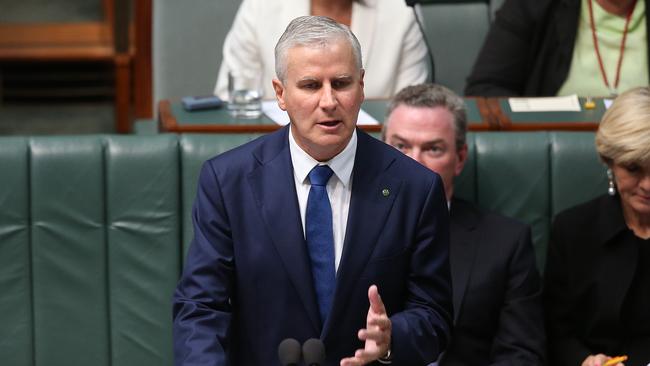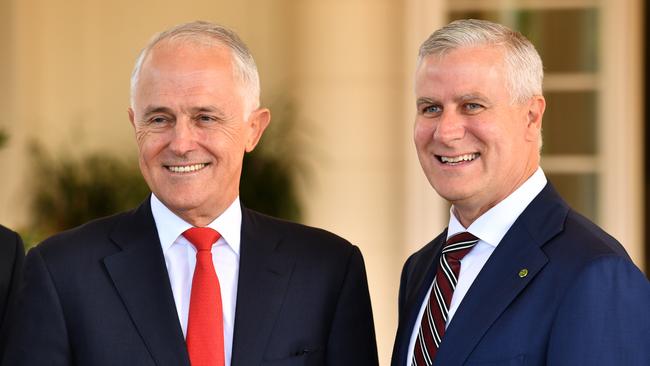Sorry, Michael, but an apology doesn’t cut it
NOTHING Michael McCormack says can change the fact that he was a grown man when he vilified the gay community, writes Seb Starcevic.
Rendezview
Don't miss out on the headlines from Rendezview. Followed categories will be added to My News.
IT didn’t take long after the new deputy prime minister was sworn in last week for his views on homosexuality to resurface.
As the editor of The Daily Advertiser in 1993, Michael McCormack wrote an op-ed calling homosexuals “sordid,” describing gay sex as “unnatural” and questioning why gay people deserve equal rights as they’re “responsible for the greatest medical dilemma known to man.”
In a follow-up article, he wrote: “I’m not about to make any apologies for having my say last week on homosexuals and the death sentence [AIDS] their filthy habits have been largely responsible for spreading.
“If something isn’t done and done quickly to prevent homosexuals getting rights they don’t deserve then God help us. One day we’ll be sorry if we allow homosexuality to pervade our school classrooms, family homes, workplaces and anywhere else for that matter.”
McCormack has apologised throughout his career for the remarks. In his first interview since becoming Nationals leader, however, he seemed eager to immunise himself against blame.
Speaking to Sky News journalist Samantha Maiden on Thursday, he said: “I think society was different then. We were under a huge and intense advertising campaign with the Grim Reaper bowling balls.”
He was referring to the infamous 1987 TV spot commissioned by the government’s National Advisory Committee on AIDS to warn the public against having unprotected sex during the spread of HIV.

In the ad, a terrifying skeletal figure bowls over groups of cowering men, women, and children as an ominous voice-over recites statistics about the AIDS crisis. Though the reaper was meant to symbolise death, some associated it with the disease’s carriers — mainly gay men, who were easily scapegoated.
Yet McCormack’s editorial was published in 1993, long after the commercial first aired. As Maiden pointed out, the deputy PM was “an adult in the early 1990s — not a child, not a teenager.”
His convenient ignorance of history might suit his redemption narrative, but it doesn’t change that he was a grown man when he abused his editorial platform to vilify the gay community.
He was also presumably an adult when he opposed same-sex marriage, voting against a bill that would have legalised it in 2012 and pledging to vote against it in 2014 it if the issue ever came to a conscience vote. At the same time, he criticised marriage equality advocates for pulling focus from “more pressing matters.”
To be clear, McCormack did eventually vote to support same-sex marriage in parliament, but only after his electorate returned a ‘Yes’ majority in the postal survey — which he admitted he never expected. That doesn’t sound like much of an ally.
None of this is to say a change of heart is impossible, just that in McCormack’s case it’s unlikely, especially given his flippancy when addressing the lingering concerns of LGBTI Australians in the Sky News interview.
“Yeah, words hurt, hurt lasts and I acknowledge that,” he said as if hate speech is just a matter of sticks and stones.

“When the same-sex marriage vote came to the parliament, I apologised again. No one asked me to,” he added as if the fact that it wasn’t dragged out of him entitles him to brownie points. “But I did. I thought it was right and proper to do so.”
In a one-two punch of tone-policing and victim-blaming, some — including Rainbow Riverina, an LGBTI group from McCormack’s electorate — have suggested it’s time for those who still hold a grudge to forgive and forget. That anyone who doubts the sincerity of McCormack’s about-face is just bitter and unwilling to let bygones be bygones.
But an apology — especially one that consists of “hey, it was the 90s” — is hardly enough to reassure a still-aching LGBTI community. They have every right to be suspicious of a political operator that has thwarted them at every turn, including subjecting them to the public flogging of a postal survey mere months ago.
It’s not unreasonable to suspect McCormack might have publicly softened his stance towards gays to cloak himself in respectability while retaining some of his homophobic zeal.
If nothing else, his promotion to the second highest office in the land proves that someone who once painted gay people as subhuman can rise to the upper echelons of Canberra without a significant dent in his political career.
Until the deputy PM commits himself to dismantling the legacy of homophobia and AIDS stigma he helped create (and no, offering to MC a same-sex relative’s wedding that wouldn’t even be happening if he’d had his way doesn’t count) he can keep his apologies.


